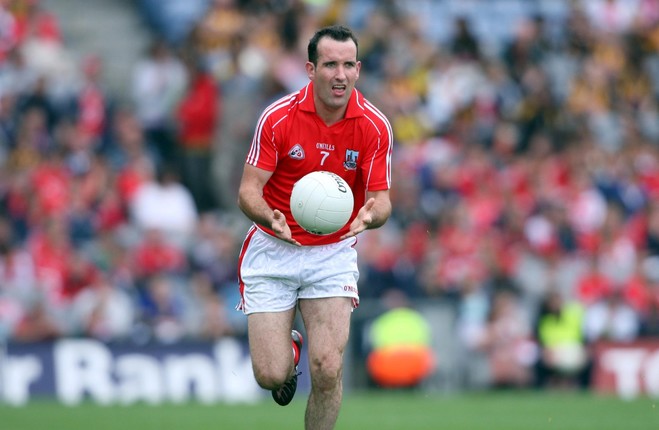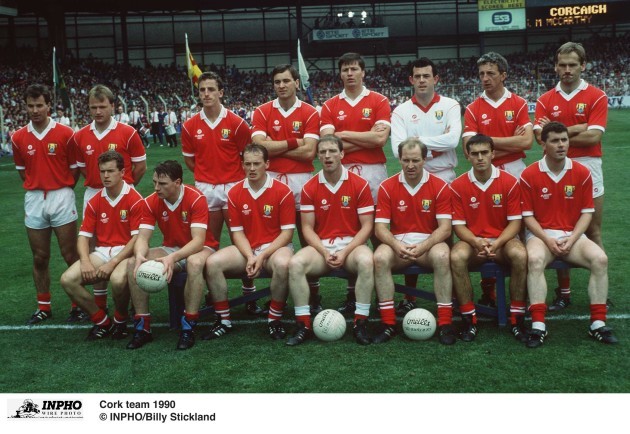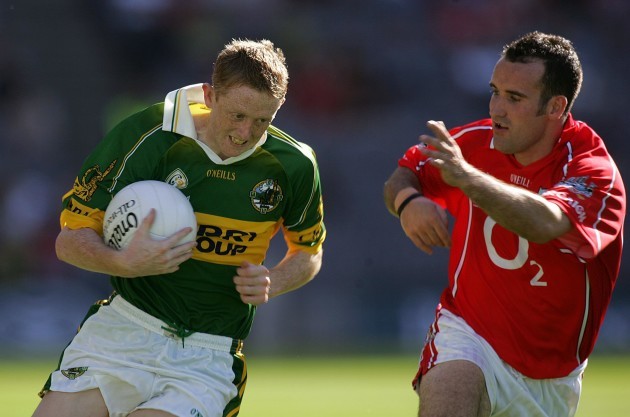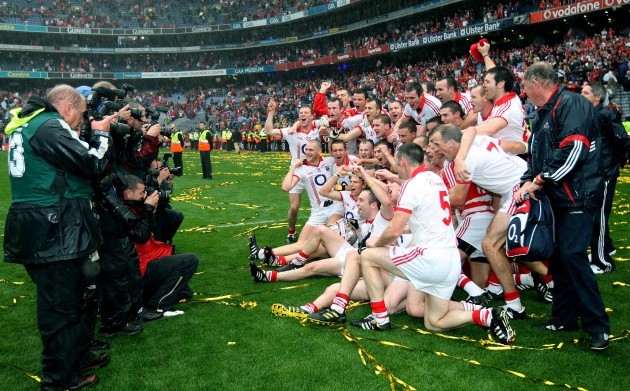“LISTEN, IT WAS the cruellest thing that could happen. A very young man, young family.
“But his memory will live long and hopefully a lot longer than any of us because he was a hell of a guy, hell of a player and you’d be talking about leaders, certainly he was one of the great leaders in that team.”
Larry Tompkins was in a reflective mood in The Double, the chronicle of Cork’s landmark GAA triumph three decades ago, talking about his old team-mate John Kerins.
Captain for that Sam Maguire success, Tompkins was part of a team anchored by the presence of Kerins in goal.
In August 2001 the team were gathered again, shouldering Kerins’ coffin to the church in The Lough in Cork city after the St Finbarr’s club man passed away following an illness.
That victorious Cork side had undergone a similarly traumatic experience in February 1998, forward Mick McCarthy was killed in a car crash along with his friend Jack Pat Collins as they returned home to Skibbereen from the National Coursing meeting in Clonmel.
There are poignant parallels with then and now. The 1990 Cork crew were stricken with grief after the loss of colleagues from the west of the county and the southside of the city.
It took 20 years for their All-Ireland achievement to be emulated by a Cork side that prevailed against Down.
And that group now has been hit a decade on from their greatest moment of sporting joy, in the same sorrowful fashion by the loss of one of the key figures in their setup.
Kieran O’Connor passed away yesterday, the Aghada man’s story sadly sharing common traits with that of Kerins, through the illness suffering and being survived by his wife and young children.
Tompkins’ words above that captured the essence and spirit of Kerins, could just as easily have been uttered by a player from the 2010 group when describing O’Connor.
In their inner sanctum he was a highly valued member. The entry to the Cork senior scene in 2004 came at a time when they seemed to be on the slide after championship days of disappointment at the hands of Roscommon and Fermanagh. Their prospects looked uncertain yet the fortunes began to turn under Billy Morgan’s tutelage and were crowned under the guidance of Conor Counihan.
That was a spectacular moment for the Aghada club, Counihan the steadying influence from the sideline for a moment of national glory with his club-mates O’Connor and Pearse O’Neill part of the players pitching in to make the win happen. They savoured the celebrations and the moment they got to bring the cup back to show everyone at home in Rostellan and Whitegate.
O’Connor did not feature during that 2010 final but he played in the 2007 and 2009 deciders, a constant component of the defensive effort in those years as Cork attempted to reach the summit.
The football climb was not easy, that Cork team was not nationally admired and often criticised for not achieving more. Their ultimate triumph was preceded by the era of dual domination by Tyrone’s greatest team and one of Kerry’s greatest teams. It arrived before Dublin burst the dam and engulfed the rest of the country with arguably the greatest team to have played the game.
But in that sense it was a striking feat by Cork to get their All-Ireland win, availing of the chance that presented itself in the 2010 summer that produced strange and weird results in the context of what went before and came after. The opportunity for success is fleeting. That Cork team seized it when it came.
Kerry had been the chief obstacle that needed to be negotiated for years. O’Connor’s on the pitch responsibilities were far from straightforward, tasked with nullifying sharpshooters like Colm Cooper and Declan O’Sullivan. He shipped scores to them but then who didn’t in that era?
It was a period where it was more commonplace for a defender to be left to his own devices in taming a lethal attacker.
He summed up the scenarios he faced perfectly in an interview in the Irish Examiner in November 2018.
“People can say I was unlucky to be marking them at their peak, but I was lucky enough to mark them.
“How many can say they got the chance to mark that sort of quality in Croke Park? Two different Cork managers on two different teams asked me to mark those players, so I had to be showing something. We had a very good Cork team a decade ago, but it was also a brilliant Kerry team.
“Their movement and skills were incredible. If you could get out in front of them, great, but if the ball is coming into them and it’s good ball, it doesn’t matter how good you are. All you can do is stand them up and slow it down.”
O’Connor kept at it during those difficult defensive roles. Team-mates can attest to his man-marking skills, the close attention he paid during training sessions helped sharpen the focus of Cork forwards.
But outside of that he was a player with a blue-collar work ethic, a steely resolve and the type of honest commitment that drove Cork on more than anything to land the All-Ireland prize they so desperately craved.
Cork’s captain Graham Canty described him ‘as one of the 100 percenters in our group’ in March of last year.
“He worked hard hard, was honest to a fault and would do anything for the group over the course of eight years.”
Canty was speaking out at a time when they were seeking to spread the word about the ‘Friends of Kieran’ group, the fund-raising initiative set up for a man who needed help in treating Ewing’s Sarcoma, the rare form of bone cancer he had been diagnosed with.
I won’t ever forget the send off and show of respect that @AghadaGAA showed Kieran and his family today. It was very emotional and very powerful, the whole club were involved. It was a huge honour to be there. Well done to all, a very proud club. pic.twitter.com/JPsOn25z5g
— paddy o shea (@osheap1) July 17, 2020
Powering that level of support were the people back home in Aghada. They had cheered O’Connor during his Cork days from 2004-11, the trio of Munster senior medals and league successes accompanying the All-Ireland milestone.
At a local level Aghada had punched away in the top-tier football ranks since their elevation in 1991. O’Connor spearheaded a group that kept pushing them on in the 2000s. They didn’t grace a final, a semi-final appearance in 2006 the furthest they travelled in the championship, but were a highly competitive senior football unit which was an impressive achievement for a club not blessed with resources and based in an area of the county that placed a traditional focus on hurling.
And their Cork football stalwart was immersed in their efforts there too. A first adult county hurling title arrived for the club with 2017’s intermediate success. By that juncture Kieran had began his treatment but in the Páirc Uí Rinn stand that night he was central to the cheering, his brother John Paul captaining the team and falling to his knees in delight at the the final whistle when the confirmation arrived of their breakthrough. Those players would reciprocate that support over the next couple of years.
“Today is one of the saddest occasions our club has ever known. There are no words that will capture just what Kieran O’Connor meant to Aghada GAA. We know that Aghada was embedded in Kieran’s heart and his club meant so, so much to him also.”
Those emotive lines in last night’s statement which relayed the news of the tragic passing, illustrated the bond that existed between the county star and his club.
That close link was there as well for the Cork class of 2010. The first of their squad to depart is a hard fact to absorb, just as it was for their predecessors in 1990, and those Rebel teams before who saw Macroom’s Tom Creedon and Clonakilty’s Tadhg Crowley pass away at young ages.
And above all there is the immeasurable loss of Kieran O’Connor for his family.
“I wouldn’t be the best man for collecting medals or minding medals,” outlined Denis Walsh, remembering those Cork 1990 experiences in The Double.
“But when I look back at 1990, the first thing that jumps into my head is Teddy McCarthy, but then as well I think of Mick and his wife, Helen, and then I think of John, and his wife, Ann, and the families.
“You know, it brings it back that way to me rather than saying that we achieved something that no one else did. I just think that we had the reunion that time and Helen was up with her son, Stephen, and then there was young John Kerins and his brother Paul, and it was fabulous to meet them. And for me to realise, it’s only a game.
“It’s important and it was important at the time, but it’s more important now that we have something together.”
Apt words then and apt words now.
Kieran O’Connor will be remembered for a life lived well.
The42 is on Instagram! Tap the button below on your phone to follow us!




